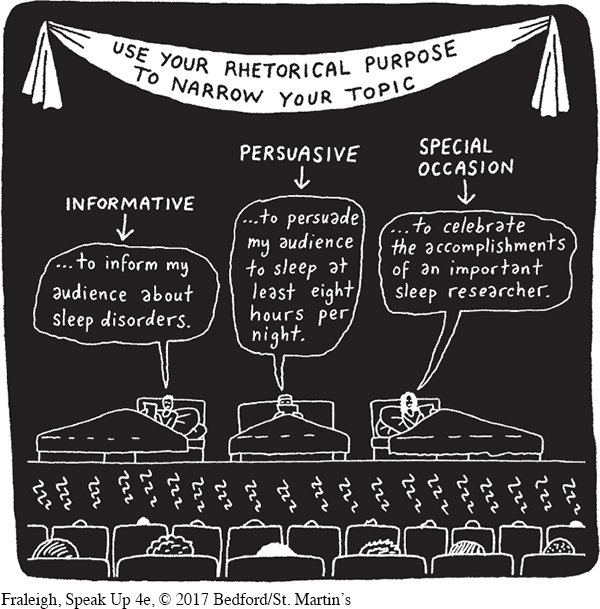Narrow Your Topic
After you’ve determined your rhetorical purpose, think about which aspects of your topic you want to cover in your speech: in other words, how will you narrow your topic so that you fulfill your rhetorical purpose? You can’t cover all aspects of the topic in a single speech, so you need to decide which aspects to focus on.
Narrowing your topic is vital for several reasons. First, it allows you to fit your speech into the available time. Whether you are speaking in a classroom or in your community, it is inconsiderate to take more than the time allocated for your presentation. Audiences may stop listening if you exceed the time limit. Also, resist any urge to speak fast or to cover each idea sketchily in order to say everything you had planned. Audiences don’t respond well to those tactics.
Second, narrowing your topic helps you focus your speech. This is an especially important step for new speakers, who often select overly broad topics. When giving a speech on a specific sport, such as cricket, a novice speaker might try to cover the equipment required, the rules, the techniques for playing well, and maybe even the sport’s history—
174

175
Conversely, one of the best sports speeches we ever heard succeeded because the speaker effectively narrowed the topic of tennis. She focused her informative speech on four interesting professional tennis personalities. The points she covered—

How should you narrow your topic? Many of the techniques you used to select your topic also can help you narrow it.
Remember Your Audience. Ask yourself whether the aspects of your topic will be interesting or important to your listeners. Kendra, a student who wanted to deliver a speech about figure skating, surveyed her classmates and found that few were interested in learning how to skate. However, most of the class planned to watch the Winter Olympics on television. Kendra narrowed her topic with the Olympics viewers in mind, choosing to explain in her speech how listeners could score the skating events while watching at home.
Draw on Your Interests and Expertise. Your special expertise or unique perspective on an aspect of your subject area can help you narrow the topic. Consider Cesar, a student who attended elementary and secondary schools in both Mexico and the United States. He selected high-
176

Review Your Rhetorical Purpose. Try to narrow your topic to an aspect appropriate for your rhetorical purpose. For example, suppose you wanted to give a speech about sleep. A focus on sleep disorders and sleep science could make an appropriate informative topic. A speech extolling the benefits of getting eight hours of sleep a night could be an emphasis for a persuasive speech. And a speech honoring the director of your university’s sleep research center would make a great special-
Evaluate the Situation. You also can use situational characteristics to help narrow your topic. For example, one student, Michelle, was interested in entomology (the study of insects), so she chose bugs as her topic. Initially, she considered narrowing her topic to the use of insects to determine time of death of murder victims. But she rejected that idea when she remembered that she would be delivering her speech shortly after lunch—
If your speech is going to be presented in a mediated context, the technology that you use can influence the direction of your speech. Consider an agricultural researcher who was used to relying on audience interactions when speaking in her local area about strategies for reducing pesticide use. Her employer asked her to record her presentation so it could be viewed at remote locations, which would make interactions impossible and therefore required a change in her approach. In the weeks before she recorded the speech, she emailed company customers in those locations and asked them what agricultural pests are most problematic in their region so she could revise her message to focus on their concerns.
177

To see a student giving a speech about a topic that should be narrowed, try Video Activity 6.2, “Overused Topic (Needs Improvement).”
178
